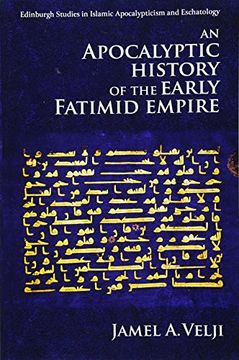Share
An Apocalyptic History of the Early Fatimid Empire (Edinburgh Studies in Islamic Apocalypticism and Eschatology) (in English)
Jamel Velji (Author)
·
Edinburgh University Press
· Paperback
An Apocalyptic History of the Early Fatimid Empire (Edinburgh Studies in Islamic Apocalypticism and Eschatology) (in English) - Jamel Velji
Choose the list to add your product or create one New List
✓ Product added successfully to the Wishlist.
Go to My WishlistsIt will be shipped from our warehouse between
Friday, June 28 and
Monday, July 01.
You will receive it anywhere in United States between 1 and 3 business days after shipment.
Synopsis "An Apocalyptic History of the Early Fatimid Empire (Edinburgh Studies in Islamic Apocalypticism and Eschatology) (in English)"
Explores the role of apocalyptic symbolism in the formation and maintenance of a medieval Islamic empireHow can religion transform a society? This book investigates the ways in which a medieval Islamic movement harnessed Quranic visions of utopia to construct one of the most brilliant and lasting empires in Islamic history (979-1171). The Fatimids' apocalyptic vision of their central place in an imminent utopia played a critical role in transfiguring the intellectual and political terrains of North Africa in the early tenth century. Yet the realities that they faced on the ground often challenged their status as the custodians of a pristine Islam at the end of time.Through a detailed examination of some of the structural features of the Fatimid revolution, as well as early works of 'ta'wil', or symbolic interpretation, Jamel Velji illustrates how the Fatimids conceived of their mission as one that would bring about an imminent utopia. He then examines how the Fatimids reinterpreted their place in history when the expected end never materialised. The book ends with an extensive discussion of another apocalyptic event linked to a Fatimid lineage: the Nizari Ismaili declaration of the end of time on August 8, 1164.Key featuresIntroduces selected themes, texts and theoretical problems in early Fatimid history and thought to those unfamiliar with Islam or the Shia tradition Explores the nature of apocalyptic rhetoric, what constitutes an apocalypse and how apocalyptic prophecies can be reinterpretedUses techniques from religious studies and rhetorical analysis on data from the Fatimid tradition, showing how Islam can contribute to broader discussions in the history of religionsContains extensive translations from two Fatimid texts, including: the 'Kitab al-Kashf' (Book of unveiling), and 'Qadi l-Nu'man's Ta'wil al-da'a'im' (Symbolic interpretation of his Pillars of Islam)
- 0% (0)
- 0% (0)
- 0% (0)
- 0% (0)
- 0% (0)
All books in our catalog are Original.
The book is written in English.
The binding of this edition is Paperback.
✓ Producto agregado correctamente al carro, Ir a Pagar.

